ACCA《P1专业会计师》基础复习(4)
- 格式:doc
- 大小:201.50 KB
- 文档页数:13
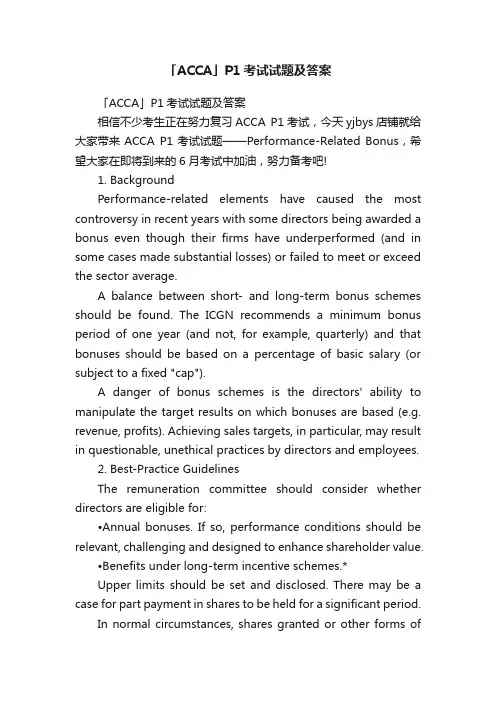
「ACCA」P1考试试题及答案「ACCA」P1考试试题及答案相信不少考生正在努力复习ACCA P1考试,今天yjbys店铺就给大家带来ACCA P1考试试题——Performance-Related Bonus,希望大家在即将到来的6月考试中加油,努力备考吧!1. BackgroundPerformance-related elements have caused the most controversy in recent years with some directors being awarded a bonus even though their firms have underperformed (and in some cases made substantial losses) or failed to meet or exceed the sector average.A balance between short- and long-term bonus schemes should be found. The ICGN recommends a minimum bonus period of one year (and not, for example, quarterly) and that bonuses should be based on a percentage of basic salary (or subject to a fixed "cap").A danger of bonus schemes is the directors' ability to manipulate the target results on which bonuses are based (e.g. revenue, profits). Achieving sales targets, in particular, may result in questionable, unethical practices by directors and employees.2. Best-Practice GuidelinesThe remuneration committee should consider whether directors are eligible for:•Annual bonuses. If so, performance conditions should be relevant, challenging and designed to enhance shareholder value.•Benefits under long-term incentive schemes.*Upper limits should be set and disclosed. There may be a case for part payment in shares to be held for a significant period.In normal circumstances, shares granted or other forms ofdeferred remuneration should not vest, and options should not be exercisable, in fewer than three years.Directors should be encouraged to hold their shares for a further period after vesting or exercise (subject to the need to finance any purchase costs and associated tax liabilities).Proposals for new long-term incentive schemes should be approved by shareholders and preferably replace existing schemes. Total potential rewards should not be excessive.Payouts or grants under all incentive schemes should be subject to "challenging performance criteria" reflecting the firm's objectives.Challenging performance criteria should:•relate to overall corporate performance;•demonstrate that demanding levels of financial performance have been achieved in the context of the firm's prospects and the prevailing economic environment;•be measured relative to an appropriate, defined peer group or other relevant benchmark; and•be disclosed and transparent.Criteria which reflect the firm's performance relative to comparable companies (e.g. shareholder return) should be considered."Sliding scales" generally provide a better motivator for improving corporate performance than a "single hurdle" by encouraging exceptional performance.Rewards under executive share option plans (ESOPs) and other long-term incentive schemes should normally be phased over a set period.In general, only basic salary should be pensionable.Consequences of basic salary increases (e.g. on pension costs)should be considered, especially for directors close to retirement.。
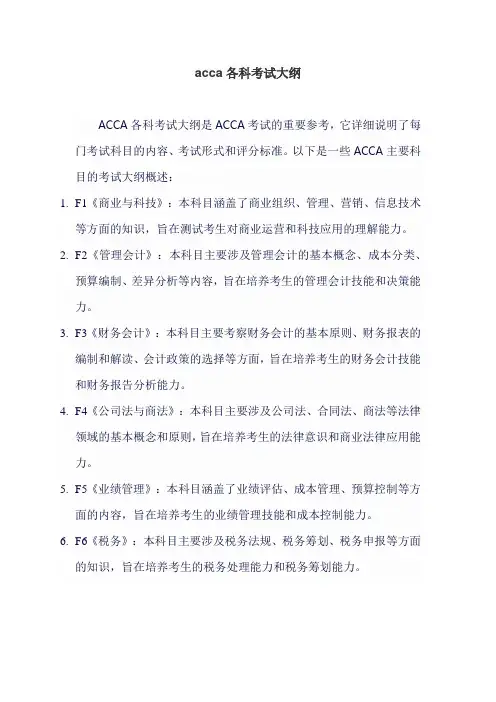
acca各科考试大纲ACCA各科考试大纲是ACCA考试的重要参考,它详细说明了每门考试科目的内容、考试形式和评分标准。
以下是一些ACCA主要科目的考试大纲概述:1.F1《商业与科技》:本科目涵盖了商业组织、管理、营销、信息技术等方面的知识,旨在测试考生对商业运营和科技应用的理解能力。
2.F2《管理会计》:本科目主要涉及管理会计的基本概念、成本分类、预算编制、差异分析等内容,旨在培养考生的管理会计技能和决策能力。
3.F3《财务会计》:本科目主要考察财务会计的基本原则、财务报表的编制和解读、会计政策的选择等方面,旨在培养考生的财务会计技能和财务报告分析能力。
4.F4《公司法与商法》:本科目主要涉及公司法、合同法、商法等法律领域的基本概念和原则,旨在培养考生的法律意识和商业法律应用能力。
5.F5《业绩管理》:本科目涵盖了业绩评估、成本管理、预算控制等方面的内容,旨在培养考生的业绩管理技能和成本控制能力。
6.F6《税务》:本科目主要涉及税务法规、税务筹划、税务申报等方面的知识,旨在培养考生的税务处理能力和税务筹划能力。
7.F7《财务报告》:本科目是F3的延伸,更深入地探讨了财务报告的编制和分析,包括合并报表、财务分析等内容,旨在培养考生的高级财务报告技能和分析能力。
8.F8《审计与认证业务》:本科目主要涉及审计程序、内部控制评估、风险管理等方面的知识,旨在培养考生的审计技能和风险管理能力。
9.F9《财务管理》:本科目涵盖了投资决策、融资决策、资本结构管理等方面的内容,旨在培养考生的财务管理技能和资本运作能力。
10.P级科目(P1-P7):这些科目是ACCA的高级阶段课程,涵盖了更专业、更深入的领域,如高级业绩管理(P1/P3)、高级财务管理(P2)、高级税务(P6)、高级审计与鉴证(P7)等。
这些科目旨在培养考生在专业领域的高级技能和知识应用能力。
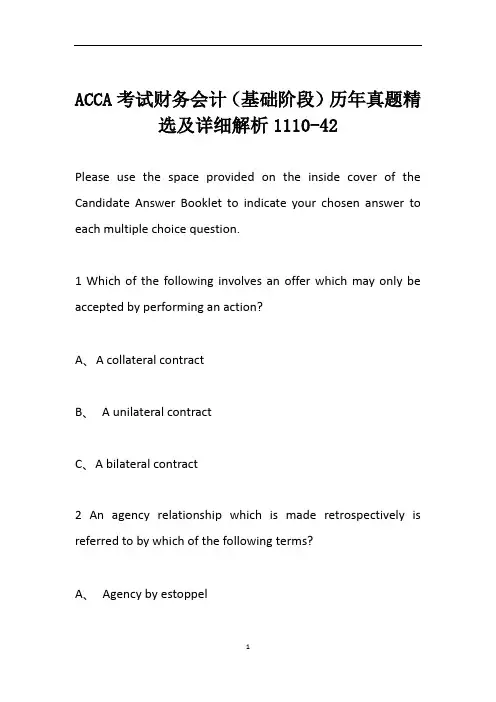
ACCA考试财务会计(基础阶段)历年真题精选及详细解析1110-42Please use the space provided on the inside cover of the Candidate Answer Booklet to indicate your chosen answer to each multiple choice question.1 Which of the following involves an offer which may only be accepted by performing an action?A、A collateral contractB、A unilateral contractC、A bilateral contract2 An agency relationship which is made retrospectively is referred to by which of the following terms?A、Agency by estoppelB、Agency by ratificationC、Agency by necessity3 In contract law, the ‘market price rule’ arises in relation to which of the following?A、OfferB 、ConsiderationC、RemotenessD、Mitigation4 In relation to a debenture, which of the following is NOT true?A 、It may be issued at a discountB、Interest on it may be paid from capitalC、It is paid after preference sharesD、It is freely transferable5 Tan writes to Yun stating that he will sell his car to him for £10,000. At the same time, Yun writes to Tan stating that he will buy his car for £10,000. Which of the following statements applies to this situation?A、There is a binding agreement due to the postal ruleB、There is a collateral contractC、There is neither an agreement nor a contract6 Which of the following statements about contracts of employment is true?A、They can be made either orally or in writingB、They must be made in writingC、They must be evidenced in writing7 Where directors make a false statement of solvency prior to a members’ voluntary liquidation, which of the following have they committed under the relevant legislation?A、A breach of criminal law with criminal penaltiesB、A breach of civil law with criminal penaltiesC、A breach of civil law with civil liabilityD、A breach of both civil and criminal law with liabilities under both8 Which of the following is the consequence when a patient signs a medical consent form before an operation?A、The patient gives up any right of action for any injury sufferedB 、Any action for any injury suffered during the operation is limited to negligenceC 、The level of any potential payment for any injury suffered is reduced9 Where a contract states the sum to be paid in the event of a breach of contract, the stated sum is known as which of the following?A、Unliquidated damagesB、Liquidated damagesC、Specific damagesD、Nominal damages10 Which of the following applies to the concept of enlightened shareholder value?A、It is the price shares can be expected to raise if they were to be soldB、It is the yardstick for assessing the performance of directors’dutiesC、It is the standard of behaviour expected of shareholders in general meetingsAnswer:1 、B2 、B3、D 4 、C 5 、C6、A7、A8 、B9、B10 、B。
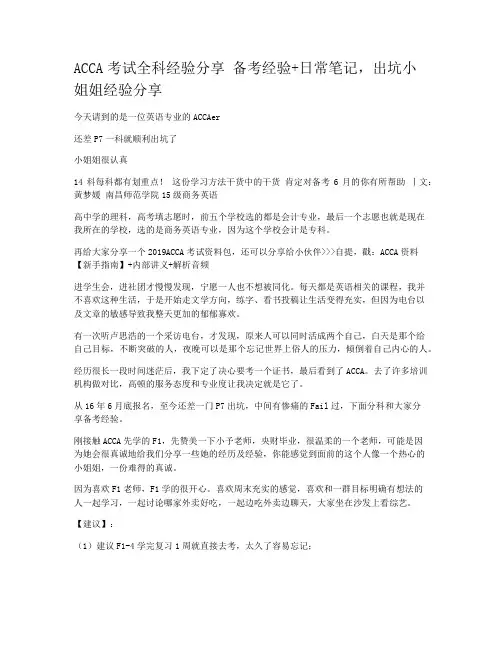
ACCA考试全科经验分享备考经验+日常笔记,出坑小姐姐经验分享今天请到的是一位英语专业的ACCAer还差P7一科就顺利出坑了小姐姐很认真14科每科都有划重点!这份学习方法干货中的干货肯定对备考6月的你有所帮助丨文:黄梦媛南昌师范学院15级商务英语高中学的理科,高考填志愿时,前五个学校选的都是会计专业,最后一个志愿也就是现在我所在的学校,选的是商务英语专业,因为这个学校会计是专科。
再给大家分享一个2019ACCA考试资料包,还可以分享给小伙伴>>>自提,戳:ACCA资料【新手指南】+内部讲义+解析音频进学生会,进社团才慢慢发现,宁愿一人也不想被同化。
每天都是英语相关的课程,我并不喜欢这种生活,于是开始走文学方向,练字、看书投稿让生活变得充实,但因为电台以及文章的敏感导致我整天更加的郁郁寡欢。
有一次听卢思浩的一个采访电台,才发现,原来人可以同时活成两个自己,白天是那个给自己目标,不断突破的人,夜晚可以是那个忘记世界上俗人的压力,倾倒着自己内心的人。
经历很长一段时间迷茫后,我下定了决心要考一个证书,最后看到了ACCA。
去了许多培训机构做对比,高顿的服务态度和专业度让我决定就是它了。
从16年6月底报名,至今还差一门P7出坑,中间有惨痛的Fail过,下面分科和大家分享备考经验。
刚接触ACCA先学的F1,先赞美一下小予老师,央财毕业,很温柔的一个老师,可能是因为她会很真诚地给我们分享一些她的经历及经验,你能感觉到面前的这个人像一个热心的小姐姐,一份难得的真诚。
因为喜欢F1老师,F1学的很开心。
喜欢周末充实的感觉,喜欢和一群目标明确有想法的人一起学习,一起讨论哪家外卖好吃,一起边吃外卖边聊天,大家坐在沙发上看综艺。
【建议】:(1)建议F1-4学完复习1周就直接去考,太久了容易忘记;(2)最好还是按照顺序考,我是先考的F3,再考的F2,最后是F1,F1内容多且杂很容易忘记,所以可以把网课里、课本上的、BPP练习册的知识点用截屏或拍照等方式,按章节顺序放在平板的相册里了,考前直接看这些图片。
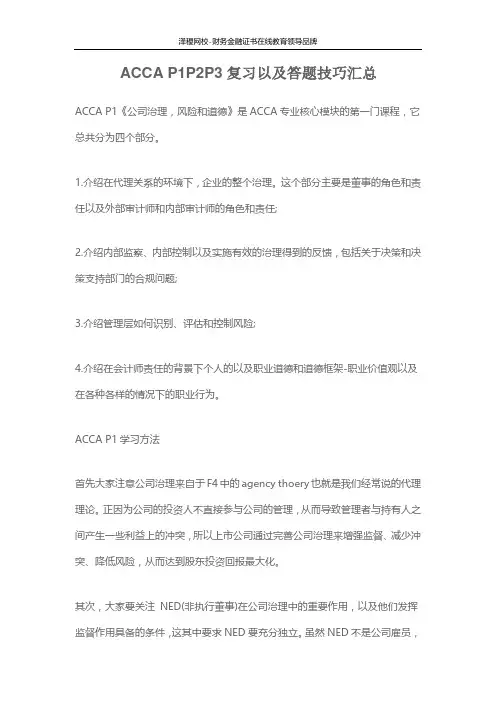
ACCA P1P2P3复习以及答题技巧汇总ACCA P1《公司治理,风险和道德》是ACCA专业核心模块的第一门课程,它总共分为四个部分。
1.介绍在代理关系的环境下,企业的整个治理。
这个部分主要是董事的角色和责任以及外部审计师和内部审计师的角色和责任;2.介绍内部监察、内部控制以及实施有效的治理得到的反馈,包括关于决策和决策支持部门的合规问题;3.介绍管理层如何识别、评估和控制风险;4.介绍在会计师责任的背景下个人的以及职业道德和道德框架-职业价值观以及在各种各样的情况下的职业行为。
ACCA P1学习方法首先大家注意公司治理来自于F4中的agency thoery也就是我们经常说的代理理论。
正因为公司的投资人不直接参与公司的管理,从而导致管理者与持有人之间产生一些利益上的冲突,所以上市公司通过完善公司治理来增强监督、减少冲突、降低风险,从而达到股东投资回报最大化。
其次,大家要关注NED(非执行董事)在公司治理中的重要作用,以及他们发挥监督作用具备的条件,这其中要求NED要充分独立。
虽然NED不是公司雇员,和公司之间没有雇佣关系,但是他们对完善和实施公司的发展战略有着重要的作用,另外NED要有足够的时间参与公司的日常经营。
再次,我请同学们关注TURNBULL REPORT和COMBINED CODE中对internal control和risk management的要求。
什么样的internal control system是完善而且有效的,如何进行risk assessment以及如何进行风险处理。
需要强调的五点:第一、考官的历年考题中只有两种格式:Memo 和letter。
烦请大家注意这两种格式第二、大家注意自己写出来的句子要专业,比如有效的内部控制要写sound internal control system, risk embedded等等第三、答题要有逻辑性,适当的通过分段,分层次来讲述自己的观点第四、要注意senario中引号的句子,这些句子一般是考点最后,希望大家多动笔,少用眼睛考虑问题。

acca备考建议ACCA备考建议ACCA(Association of Chartered Certified Accountants)是全球最大的会计师协会之一,拥有全球超过200个国家的会员。
ACCA考试是全球公认的金融、财务和会计领域最具含金量的职业资格之一。
想要通过ACCA考试,需要具备良好的英语能力和扎实的专业知识。
下面是一些ACCA备考建议,希望能对大家有所帮助。
一、了解ACCA考试内容在备考ACCA考试之前,首先需要了解ACCA考试内容。
ACCA共分为三个阶段:基础阶段、专业阶段和高级专业阶段。
其中基础阶段包括F1-F9九门课程;专业阶段包括P1-P7七门课程;高级专业阶段包括SBL、SBR、AFM、APM、ATX和AAA六门课程。
二、制定合理的学习计划制定合理的学习计划是备考过程中至关重要的一步。
根据自己的时间和情况,制定出详细可行的学习计划,并按照计划执行。
可以将每门课程分成多个部分,逐步完成,并在每个部分完成后进行测试和复习,确保自己的学习进度和效果。
三、选择适合自己的学习方式ACCA备考有多种学习方式,如线下班课、在线课程、自学等。
根据自己的实际情况和学习需求选择适合自己的学习方式。
线下班课可以让你与老师和同学互动,获得更多的帮助和支持;在线课程可以让你随时随地进行学习,方便快捷;自学可以让你根据自己的节奏进行学习,并根据需要调整计划。
四、注重练习和模拟考试练习和模拟考试是备考过程中必不可少的一部分。
通过练习题目可以加深对知识点的理解,并提高解题能力;通过模拟考试可以检验自己的备考效果,并提前适应考试环境。
建议在备考过程中进行多次模拟考试,并认真分析错题原因,及时调整复习计划。
五、注意时间管理ACCA考试时间紧张,需要在有限时间内完成大量内容。
因此,在备考过程中要注意时间管理。
可以制定详细的时间表,合理安排每天的复习任务,避免拖延和浪费时间。
同时,在考试过程中要注意控制时间,把握好每个题目的答题时间,确保完成所有题目。
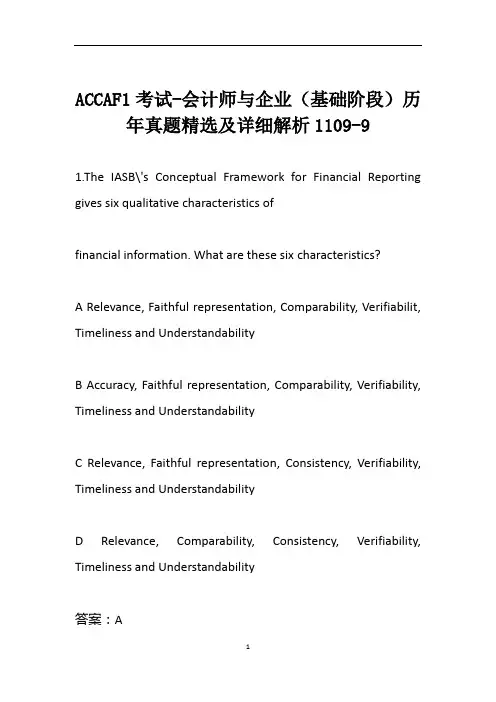
ACCAF1考试-会计师与企业(基础阶段)历年真题精选及详细解析1109-91.The IASB\'s Conceptual Framework for Financial Reporting gives six qualitative characteristics offinancial information. What are these six characteristics?A Relevance, Faithful representation, Comparability, Verifiabilit, Timeliness and UnderstandabilityB Accuracy, Faithful representation, Comparability, Verifiability, Timeliness and UnderstandabilityC Relevance, Faithful representation, Consistency, Verifiability, Timeliness and UnderstandabilityD Relevance, Comparability, Consistency, Verifiability, Timeliness and Understandability答案:A2. Listed below are some comments on accounting concepts.1 Financial statements always treat the business as a separate entity.2 Materiality means that only items having a physical existence may be recognised as assets.3 Provisions are estimates and therefore can be altered to make the financial results of a business more attractive to investors.Which, if any, of these comments is correct, according to the IASB\'s Conceptual Framework for Financial Reporting?A 1 onlyB 2 onlyC 3 onlyD None of them答案:A3. Listed below are some characteristics of financial information.1 Relevance2 Consistency3 Faithful representation4 AccuracyWhich of these are qualitative characteristics of financial information according to the IASB\'s Conceptual Framework for Financial Reporting?A 1and2onlyB 2 and 4 onlyC 3 and 4 onlyD 1 and 3 only答案:D4. Which ONE of the following statements describes faithful representation, a qualitative characteristic of faithful representation?A Revenue earned must be matched against the expenditure incurred in earning it.B Having information available to decision-makers in time to be capable of influencing their decisions.C The presentation and classification of items in the financial statements should stay the same from one period to the next.D Financial information should be complete, neutral and free from error5. According to the IASB\'s Conceptual Framework for Financial Reporting, which TWO of the following are part of faithful representation?1 It is neutral2 It is relevant3 It is presented fairly4 It is free from material errorA 1and2B 2and3C 1and4D 3and4。
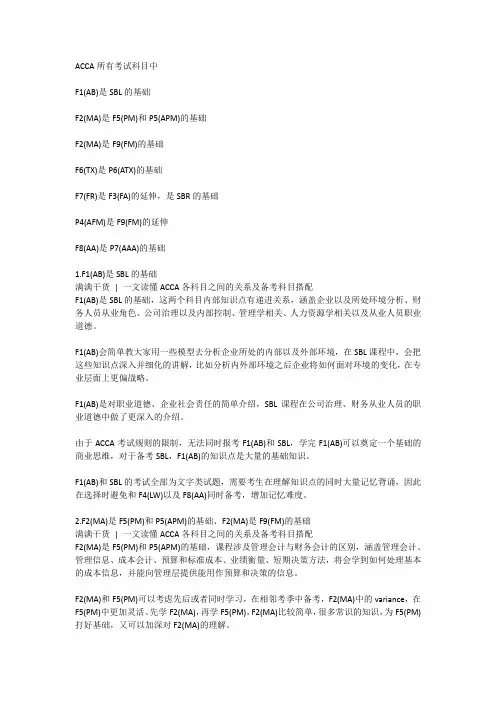
ACCA所有考试科目中F1(AB)是SBL的基础F2(MA)是F5(PM)和P5(APM)的基础F2(MA)是F9(FM)的基础F6(TX)是P6(ATX)的基础F7(FR)是F3(FA)的延伸,是SBR的基础P4(AFM)是F9(FM)的延伸F8(AA)是P7(AAA)的基础1.F1(AB)是SBL的基础满满干货| 一文读懂ACCA各科目之间的关系及备考科目搭配F1(AB)是SBL的基础,这两个科目内部知识点有递进关系,涵盖企业以及所处环境分析、财务人员从业角色、公司治理以及内部控制、管理学相关、人力资源学相关以及从业人员职业道德。
F1(AB)会简单教大家用一些模型去分析企业所处的内部以及外部环境,在SBL课程中,会把这些知识点深入并细化的讲解,比如分析内外部环境之后企业将如何面对环境的变化,在专业层面上更偏战略。
F1(AB)是对职业道德、企业社会责任的简单介绍,SBL课程在公司治理、财务从业人员的职业道德中做了更深入的介绍。
由于ACCA考试规则的限制,无法同时报考F1(AB)和SBL,学完F1(AB)可以奠定一个基础的商业思维,对于备考SBL,F1(AB)的知识点是大量的基础知识。
F1(AB)和SBL的考试全部为文字类试题,需要考生在理解知识点的同时大量记忆背诵,因此在选择时避免和F4(LW)以及F8(AA)同时备考,增加记忆难度。
2.F2(MA)是F5(PM)和P5(APM)的基础、F2(MA)是F9(FM)的基础满满干货| 一文读懂ACCA各科目之间的关系及备考科目搭配F2(MA)是F5(PM)和P5(APM)的基础,课程涉及管理会计与财务会计的区别,涵盖管理会计、管理信息、成本会计、预算和标准成本、业绩衡量、短期决策方法,将会学到如何处理基本的成本信息,并能向管理层提供能用作预算和决策的信息。
F2(MA)和F5(PM)可以考虑先后或者同时学习,在相邻考季中备考,F2(MA)中的variance,在F5(PM)中更加灵活。
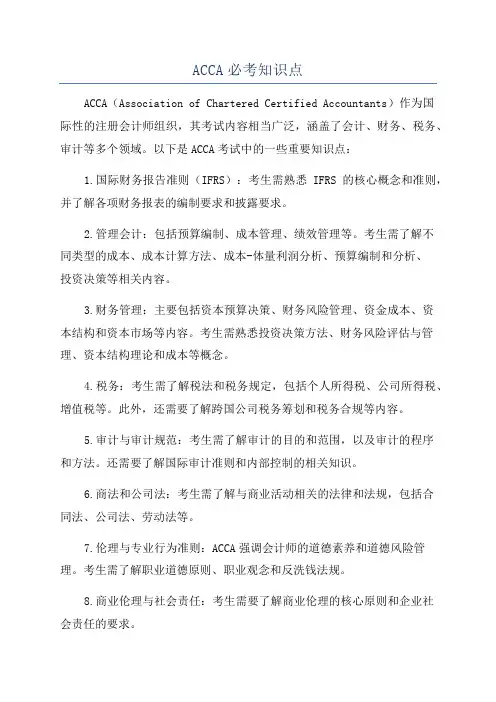
ACCA必考知识点ACCA(Association of Chartered Certified Accountants)作为国际性的注册会计师组织,其考试内容相当广泛,涵盖了会计、财务、税务、审计等多个领域。
以下是ACCA考试中的一些重要知识点:1.国际财务报告准则(IFRS):考生需熟悉IFRS的核心概念和准则,并了解各项财务报表的编制要求和披露要求。
2.管理会计:包括预算编制、成本管理、绩效管理等。
考生需了解不同类型的成本、成本计算方法、成本-体量利润分析、预算编制和分析、投资决策等相关内容。
3.财务管理:主要包括资本预算决策、财务风险管理、资金成本、资本结构和资本市场等内容。
考生需熟悉投资决策方法、财务风险评估与管理、资本结构理论和成本等概念。
4.税务:考生需了解税法和税务规定,包括个人所得税、公司所得税、增值税等。
此外,还需要了解跨国公司税务筹划和税务合规等内容。
5.审计与审计规范:考生需了解审计的目的和范围,以及审计的程序和方法。
还需要了解国际审计准则和内部控制的相关知识。
6.商法和公司法:考生需了解与商业活动相关的法律和法规,包括合同法、公司法、劳动法等。
7.伦理与专业行为准则:ACCA强调会计师的道德素养和道德风险管理。
考生需了解职业道德原则、职业观念和反洗钱法规。
8.商业伦理与社会责任:考生需要了解商业伦理的核心原则和企业社会责任的要求。
9.资本市场:考生需要了解股票市场、债券市场和货币市场的基本知识,包括证券发行、股票投资组合管理等。
10.管理信息系统:考生需要了解信息系统的开发、实施和管理,以及信息安全和数据分析等内容。
此外,ACCA考试还有一些与个人发展和交流有关的知识,如沟通技巧、领导力和团队合作等。
考生可以根据自己的实际情况和所报考的科目选择相应的重点知识点进行学习和准备。
总结起来,ACCA考试的知识点涉及面相当广泛,需要考生全面的了解和掌握。
准备ACCA考试需要进行系统的学习和复习,掌握基本概念和重要原理,同时也要注重实践能力的培养和应用能力的提升。
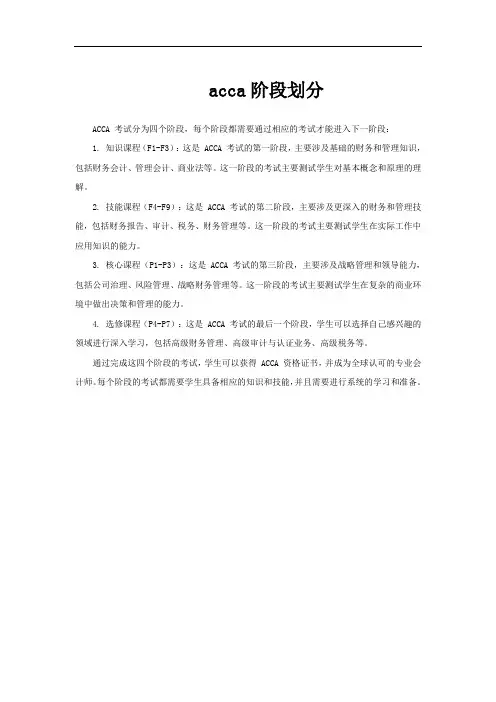
acca阶段划分
ACCA 考试分为四个阶段,每个阶段都需要通过相应的考试才能进入下一阶段:
1. 知识课程(F1-F3):这是 ACCA 考试的第一阶段,主要涉及基础的财务和管理知识,包括财务会计、管理会计、商业法等。
这一阶段的考试主要测试学生对基本概念和原理的理解。
2. 技能课程(F4-F9):这是 ACCA 考试的第二阶段,主要涉及更深入的财务和管理技能,包括财务报告、审计、税务、财务管理等。
这一阶段的考试主要测试学生在实际工作中应用知识的能力。
3. 核心课程(P1-P3):这是 ACCA 考试的第三阶段,主要涉及战略管理和领导能力,包括公司治理、风险管理、战略财务管理等。
这一阶段的考试主要测试学生在复杂的商业环境中做出决策和管理的能力。
4. 选修课程(P4-P7):这是 ACCA 考试的最后一个阶段,学生可以选择自己感兴趣的领域进行深入学习,包括高级财务管理、高级审计与认证业务、高级税务等。
通过完成这四个阶段的考试,学生可以获得 ACCA 资格证书,并成为全球认可的专业会计师。
每个阶段的考试都需要学生具备相应的知识和技能,并且需要进行系统的学习和准备。
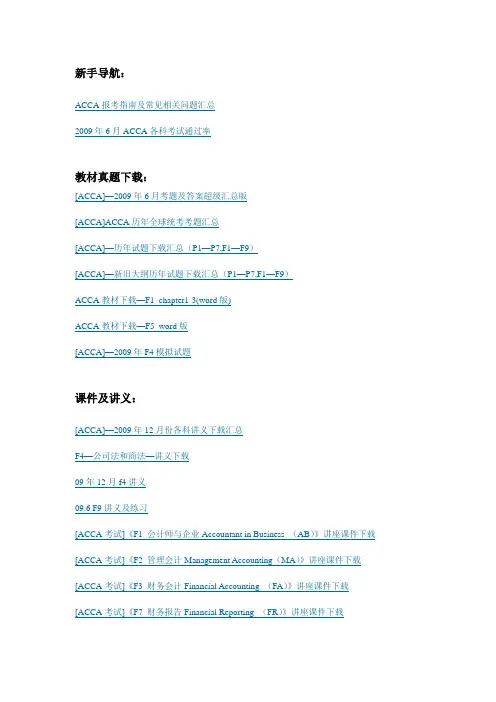
新手导航:ACCA报考指南及常见相关问题汇总2009年6月ACCA各科考试通过率教材真题下载:[ACCA]—2009年6月考题及答案超级汇总版[ACCA]ACCA历年全球统考考题汇总[ACCA]—历年试题下载汇总(P1—P7,F1—F9)[ACCA]—新旧大纲历年试题下载汇总(P1—P7,F1—F9)ACCA教材下载—F1_chapter1-3(word版)ACCA教材下载—F5_word版[ACCA]—2009年F4模拟试题课件及讲义:[ACCA]—2009年12月份各科讲义下载汇总F4—公司法和商法—讲义下载09年12月f4讲义09.6 F9讲义及练习[ACCA考试]《F1 会计师与企业Accountant in Business (AB)》讲座课件下载[ACCA考试]《F2 管理会计Management Accounting(MA)》讲座课件下载[ACCA考试]《F3 财务会计Financial Accounting (FA)》讲座课件下载[ACCA考试]《F7 财务报告Financial Reporting (FR)》讲座课件下载[ACCA考试]《F8 审计与认证服务Audit and Assurance Services(AAS)》讲座课件下载备考辅导:F5复习资料F9复习资料整理分享2009年11月考官文章汇总资料2009年10月考官文章汇总资料2009年12月ACCA考试tips大全!ACCA字典会计科目中英对照经验分享:[经验分享]ACCA看书有诀窍[经验分享]中国ACCA第一人:吴卫军[经验分享]我的ACCA考试经验、教训以及建议[经验分享]F7,F9 的攻略(ACCA考试总结)[经验分享]ACCA考试高手的经验[经验分享]ACCA考试技巧与学习方法[经验分享]ACCA工作经验-work Experience[经验分享]—ACCA考试试题的特点及做题技巧分析[经验分享]—ACCA考试技巧与学习方法![经验分享]—ACCA三遍循环法[经验分享]—ACCA考试实战攻略(1)[经验分享]—ACCA考试实战攻略(2)[ACCA考试]《F3 财务会计 Financial Accounting (FA)》讲座课件下载ACCA F6 真题[ACCA]ACCA各Paper考官一览表[ACCA考试]《F1 会计师与企业 Accountant in Business (AB)》讲座课件下载[ACCA考试]2007年12月开始执行的新大纲的模拟试题[ACCA]ACCA历年全球统考考题汇总[ACCA]教材相关问题汇总[转贴]我是这样考过ACCA的(word版)[转贴]ACCA考试经验及P1.2-P2.2攻略(完整下载版)[转帖]ACCA看书有诀窍[转帖]中国ACCA第一人:吴卫军[转帖]我的ACCA考试经验、教训以及建议[ACCA考试]《F8 审计与认证服务 Audit and Assurance Services(AAS)》讲座课件下载[ACCA考试]《F2 管理会计 Management Accounting(MA)》讲座课件下载[ACCA考试]《F7 财务报告 Financial Reporting (FR)》讲座课件下载[ACCA]ACCA 考试报考指南ACCA 考试介绍特许公认会计师公会(The Association of Chartered Certified Accountants,简称ACCA) 成立于1904年,是目前全球最大的国际会计师组织。
【ACCA考经分享】不要轻易玩"3P",一次性过P1P2P3的学员分享本人是江财ACCA专业的,12月考试之前每天都昏天黑地,每天都在背了忘,忘了背。
在这里希望能将自己的一些心得体会能与各位ACCAer分享,希望大家都能过过过。
关于是否一次性报考3门的问题一次报考三门一定是有很大压力的,更何况是三门P。
因为现在每个考季间隔三个月,当时也是抱着冲一冲的心态,没过再来,但是真的发现时间很不够!如果追求高分数或者是求稳一点通过的同学们不建议一次报考超过两门,很有可能精力太分散导致都没过。
尤其对于P阶来说,题目长,文字表述能力的要求大大提高,所以需要一个适应的过程。
英语不好的小伙伴们一定要加强背诵和书写,如果你不是英语好到看一遍泽稷网校ACCA网课和讲义就能自带光环五六十分的那种人,一定要踏踏实背背背,练练练!注意ACCA考试时间在这里一定要单独提醒考试时间的问题,要快要快要快!重要的事情说三遍!!!做不完基本上很难通过!每门都是很赶很赶很赶的!所以一定要加快阅读速度,在阅读时间的15分钟看第一题,先看问题再看案例,在卷子上标记出答案要包含的点,最多在开始答卷的10分钟一定要构思完开始作答。
书写速度也要快,答题册一定要写过半,语言质量要保证(毕竟P阶,从句、虚拟别吝啬),注意答案要分点,利用小标题,假想自己是考官,怎么容易阅卷怎么写。
有思路的题先写,先拿到有把握的分。
P1——传说中过它还是看气质都说P1靠扯,其实这句话很有道理,这门科目真的偏理论、空洞。
但是不要以为人人都能靠扯就通过了。
首先还是背,不背肚子里没墨怎么扯?背的时候注意一些高分词,像uncontaminated decision等,在听网课的时候要勾下来。
还有就是道德立场要高尚,不要看电视剧里的玛丽苏不讨喜,考试的时候要毫无保留地。
ACCAF4知识点总结ACCA F4(全称为Corporate and Business Law,企业与商法)是ACCA(特许公认会计师协会)的考试科目之一,该科目旨在培养学生对法律和道德标准在商业环境中的应用能力。
下面是ACCA F4考试的重要知识点的总结。
1.法律体系与法律制度-法律体系的分类:普通法系、大陆法系、伊斯兰法系。
-各种法律制度的特点和适用范围。
2.法律规则与制度-法律的层级:宪法、立法、裁判法、平行法、国际法。
-法律规则的优先级和适用原则。
3.国家和政府-国家和国家主权的概念和要素。
-不同行政体制和政府机构的职责和权力。
4.法人与商法-法人的种类和特征:公司法主体、合伙公司、有限责任公司等。
-公司注册和运营的法律要求。
-公司治理的原则和实践。
5.合同法-合同法的定义和要素。
-合同的形成、要约的接受和契约的生效。
-合同的履行、违约和争议解决。
6.担保法与信托法-法律担保的种类和特点:抵押、质押、保证等。
-信托的定义、要素和种类。
-信托的设立、运作和终止。
7.货物买卖与供货合同-货物买卖合同的要素和合同条款。
-瑕疵物品的权利和救济。
-供货合同的要求和责任。
8.雇佣法与劳动法-雇佣合同的要素和权利义务。
-雇佣关系的终止:辞退、解聘和离职。
-劳动法的基本原则和劳动者权益保护。
9.公司法与企业管理-公司法的基本原则和要求。
-公司规章制度和内部控制的建立与遵守。
-公司法违规行为和违规惩罚。
10.版权法与知识产权-版权的定义和要素。
-知识产权的保护和侵权行为。
-知识产权的转让和许可。
11.环境法与可持续发展-环境法的原则和目标。
-环境保护和可持续发展的法律要求。
-环境法违规行为和违规惩罚。
12.欺诈与舞弊-欺诈和舞弊的定义和要素。
-欺诈和舞弊的波及范围。
-欺诈和舞弊的法律后果和罚则。
最后,ACCAF4科目的学习还需要考生掌握一定的案例分析能力,能够将法律知识运用到实际情境中进行分析和决策。
因此,除了对以上知识点的理解和记忆,考生还应该多进行案例练习,培养自己的实务能力和解决问题的能力。
npo acca知识点ACCA是全球性的财务会计职业资格证书,该证书为财务和会计领域的专业人士提供了广泛的知识和技能,有助于他们在全球范围内寻求职业发展和提升职业水平。
下面将会介绍ACCA考试中的知识点。
1. 会计原则及概念会计原则是指财务会计领域的基本规则,包括货币计量原则、确认实现原则、相对性原则、谨慎原则和连续性原则。
会计概念则包括企业实体概念、会计期间概念、会计基础概念、会计报表稳健性概念。
这些概念和原则是财务会计的基础,它们有效地确保了财务报表的精确性和透明度。
2. 财务报表财务报表包括资产负债表、利润表和现金流量表。
资产负债表显示企业的资产、负债和股东权益的状态。
利润表显示企业在会计期间的营业额、成本、费用和净收益。
现金流量表显示企业在会计期间现金流入和现金流出的情况。
这些报表是企业的关键财务信息来源,对于管理、投资和决策都至关重要。
3. 税收ACCA考试也涉及许多税收问题,包括企业税收和个人税收。
其中,涉及到的主要税种有:所得税、增值税、消费税、遗产税和赠与税等。
纳税人需要了解不同税种的纳税规则、计算和申报过程,以及相关税收法律的各项规定等。
4. 预算与成本管理预算和成本管理是企业的关键管理工具,涉及到企业的预算编制、绩效评估、成本分析和控制等方面。
ACCA考试中,还会重点考察预算及其编制、成本分类、成本控制、成本核算等内容,这些知识点对于企业的经营决策和管理都至关重要。
5. 风险管理风险管理是指在不确定的环境下,有效地管理和控制企业面临的各种风险。
ACCA考试中会涉及到的相关知识点有风险评估、风险识别、风险控制和风险管理策略等。
这些知识点对于企业稳健发展和风险防范至关重要。
总之,ACCA考试的知识点非常广泛,主要涵盖了财务和管理领域的各个方面。
ACCA的职业资格证书主要是面向财务和会计专业人士,全球化的认可度极高。
对于想要在财务和会计领域发展的人来说,取得ACCA资格证书是非常有价值的。
ACCA F1 重点词汇大全1. Accountablity 责任2. Accounting 会计3. Activist 积极分子4. Ad hoc 临时5. Advocacy 辩护6. Agency theory 代理理论7. Aggregate demand 总需求8. Aggregate supply 总供给9. Apprisal 评估10. Artefact 人工11. Asset 资产12. Audit 审计13. Audit committee 审计委员会14. Audit trail 审计追踪15. Authority 权威16. Back-up 备份17. Balance of payment 国际收支平衡18. Bargaining power 讨价还价能力19. Belief 信仰20. Bonus scheme 奖金制度21. Boundaryless 无边界组织22. Budget 预算23. Business cycle 商业周期24. Business strategy 商业战略25. Capital 资本26. Capital expenditure 资本性支出27. Capital market 资本市场28. Centralization 集权29. Coach 教练30. Coercive 强迫31. Committee 委员会32. Competence 称职33. Compliance 遵守34. Confidentiality 保密性35. Conflict of interest 利益冲突36. Consensus 一致37. Consumer price index (CPI) 居民消费价格指数38. Consumer surplus 消费者剩余39. Contingency 权变40. Corporate 合作41. Corporate social responsibility (CSR) 企业社会责任42. Code of ethics 行为规范43. Cyclical unemployment 周期性失业44. Data 数据45. Decentralization 分权46. Delayering 简化管理结构47. Delegation 授权48. Demand 需求49. Demand curve 需求曲线50. Deontology 义务论51. Depression 萧条52. Direct discrimination 直接歧视53. Dismissal 辞退54. Diversity 多样性55. Dorming 调整期56. Double-entry bookkeeping 复式记账法57. Egoism 利己主义58. Elasticity 弹性59. Empowerment 授权60. Entrepreneurial 企业家61. Environmental footprint 环境脚印62. Equilibrium price 平衡价格63. Ethics 道德64. Exchange rate 汇率65. Executive director 执行董事66. External 外部67. Feedback 反馈68. Fiduciary responsibility 诚信义务69. Finance function 财务部70. Financial accounting 财务会计71. Financial statement 财务报表72. Firm 企业73. Fiscal policy 财政政策74. Flat organization 扁平结构75. Fraud 舞弊76. Frictional unemployment 摩擦性失业77. Generally Accepted Accounting Practice (GAAP) 美国通用会计准则78. Governance principle 治理原则79. Grievance 委屈80. Gross Domestic product 国内生产总值81. Gross National product 国民生产总值82. Group thinking 团队思维83. Hawthorne Study 霍桑实验84. Hollow organization 中空组织85. Honesty 诚实86. Hospitablity 热情87. Human Resourse Management (HRM) 人力资源管理88. Hygiene 保健89. Imperfect competition 不完全竞争90. Inbound logistic 向内运输91. Incentive 刺激92. Income 收入93. Induction 入职培训94. Inferior good 劣质产品95. Inflation 通货膨胀96. Inseparability 不可分割97. Intangibility 无形98. Integrity 诚实99. Intellectual 智商100. Interest rate 利率101. Internal audit 内审102. Internal control 内控103. International Accounting Standard Board (IASB) 国际会计准则理事会104. International Federation of Accountant (IFAC) 国际会计师联合会105. Interpersonal 人际106. Interview 面试107. Intimidation 恐吓108. Intrinsic 内部109. Job enlargement 工作扩大化110. Job enrichment 工作丰富化111. Job rotation 工作轮岗制112. Joint committee 联合委员会113. Judgement 判决114. Leadership 领导力115. Learning process 学习过程116. Liablity 负债117. Limited liability 有限责任118. Litigation 诉讼119. Lowballing 虚报低价120. Macroeconomic 宏观经济121. Management 管理122. Marginal utility 边际效益123. Market 市场124. Matrix 矩阵125. Mentor 导师126. Middle line 企业中层127. Microeconomic 微观经济128. Minimum wage 最低工资标准129. Module 模块130. Monetary policy 货币政策131. Money laundering 洗钱132. Monopolistic competition 垄断竞争133. Monopoly 垄断134. Morale 士气135. Motivation 激励136. Mourning 悲哀137. Multiplier effect 乘数效应138. Nomination committee 提名委员会139. Non-current asset 固定资产140. Non-governmental organization 非政府组织141. Norm 原则142. Objectivity 客观143. Offshore 离岸144. Oligopoly 寡头垄断145. Operational 运营146. Organization 组织147. Outbound logistic 向外运输148. Output 输出149. Oursource 外包150. Overhead 间接成本151. Ownership 所有权152. Partnership 合伙制153. Password 密码154. Payable 应付账款155. Payroll 工资156. Perception 感知157. Performance management 业绩管理158. Personality 性格159. Political 政治160. Price mechanism 定价机制161. Priortization 优先162. Privacy 隐私163. Probity 诚实164. Process 流程165. Procurement 采购166. Product life cycle 产品生命周期167. Professional 专业168. Profit 利润169. Project 项目170. Public sector 公共部门171. Purchasing 采购172. Quality control 质量控制173. Rate of unemployment 失业率174. Rational 理性175. Raw material 原材料176. Receivable 应收账款177. Recession 衰退178. Recovery 恢复179. Recruit 招聘180. Redundancy 裁员181. Relativism 相对主义182. Reputation 声誉183. Remuneration 薪酬184. Resignation 辞职185. Reward 奖励186. Retail Price Index (RPI) 居民消费价格指数187. Sarbanes-Oxley Act 萨班斯法案188. Scalar chain 层级链189. Selection 选拔190. Share capital 实收资本191. Shareholder 股东192. Social class 社会层级193. Sole trader 个体户194. Span of control 控制维度195. Spreadsheet 电子表格196. Stagflation 停滞性通货膨胀197. Stakeholder 企业利益相关者198. Strategy 战略199. Substitute 替代品200. Supervision 监督201. Supply 供给202. Synergy 协作203. Taxation 税务204. Team building 团队建设205. Teeming and lading 拆东墙补西墙206. Theorist 理论家207. Transparancy 透明208. Treasury 财政209. Uncertainty 不确定性210. Unemployment 失业211. Utilitarianism 功利主义212. Valence 效价213. Value chain 价值链214. Variable 变量215. Victimisation 受害216. Whistleblow 告密者217. Working capital 营运资本218. World Trade Organization (WTO) 世界贸易组织由东亚国际ACCA金牌讲师——孔令裔精心整理。
ACCA《P1专业会计师》基础复习(4)本文由高顿ACCA整理发布,转载请注明出处3. Stakeholders theory3.1 Definition and components of stakeholders<1>Definition: any entity (person, group or possibly non-human entity)that can affect or be affected by the actions or policies of an organization. It is a bi-directional relationship. Each stakeholder group has different expectations about what it wants and different claims upon the organization.<2>Components: directors; employee; suppliers; customers; bank; lenders; regulators; government; community and environmental pressure groups, etc.3.2 Classifications of stakeholders<1> Internal, connected, and external stakeholdersa. Internal: employees, managementb. Connected: shareholder, customers, suppliers, competitors, trade unionsc. External: government, the public, pressure group, opinion leaders<2> Narrow and wide stakeholders (affected by the organization’s strategy, how much the organization affects the stakeholder)a. Narrow (most affected):managers, employees, supplies, dependent customers, shareholdersb. Wide (less affected):government, wide community, less dependent customers<3> Primary and secondary stakeholders (level of participation will affect the company’s continuing as a goi ng concern or not, how much the stakeholder affected the organization)a. Primary (most affected):customers, suppliers, governmentb. Secondary (less affected):broad communities, management<4> Active and passive (seek to participate in the o rganization’s activities)a. Active: managers, shareholders, regulators or pressure groupsb. Passive: shareholders, local communities, government3.3 Stakeholder theory<1> Content of stakeholder theorya. Stakeholders’ contribution and requirement: stakeholders contribute for company’s development and expect the company to satisfy their interest.b. Different goals and claims of stakeholder: each stakeholder group has different goals and expectations, so they have different claim upon the organization.c. Company’s corporate responsibility: companies should take corporate accountability to not only shareholder but also a broad range of stakeholder.d. Manager’s reconciliation of conflict of interest: management, as agent to all other stakeholders, should try to reconcile the competing interests of stakeholders based on maximum of long-term value. (Mendelow Matrix)<2>Stakeholders’ claima. Definition: what does stakeholder want from an organization?b. The legitim acy of each stakeholder’s claim will depend on your ethical and political perspective on whether certain groups should be considered as stakeholders.<3> Different views of organizations’ reaction to stakeholder concernsa. Instrumental view – mainly economic/legal responsibilities with the aim of maximizing profits and no moral standpoint of its own. (Company believes fulfilling the responsibility to stakeholders will increase their profits.)b. Normative view – ethical/philanthropic responsibilities as well as economic/legal, and have moral duties toward stakeholders. Company accepts a responsibility to sustain social cohesion.3.4 Role and interest of stakeholders3.4.1 Internal stakeholder<1>Directora. Roles:(a)Executive director responsible for corporation management of the company(b)NEDs focus on monitor and control company in best interest of stakeholdersb. Interests:(a)Remuneration package(b)Status/reputation/power<2> Company secretarya. Roles:(a)Ensure compliance with company laws and regulations and keep board members informed of their legal responsibilities(b)Attend meetings and prepare minutes to follow up, administer company’s affairs(c)Help board to deal with corporate governance matters and improve corporate governance of listed companyb. Interests:(a)Remuneration package(b)Security and job stability(c)Career path and development(d)Status/position<3> Sub-board managementa. Roles:(a)Day to day running of business and implement board policies(b)Risk management and internal control of the company(c)Concern with corporate governance and report to board of directorb. Interests:(a)Remuneration package(b)Security and job stability(c)Career path and development(d)Status/position<4> Employeesa. Roles:(a)Implementation of strategy and comply with the corporate governance systems in place and adopt appropriate culture(b)Perform routine activities and comply with internal controls(c)Give feedback, report breaches to senior management or boardb. Interests:(a)Remuneration package(b)Security and job stability(c)Career path and development(d)Status/position<5> Trade unionsa. Roles:(a)Distribute information to employee and protect employee interests(b)Secure employee benefit and enforce government regulations/employee legislations, e.g. protection of whistleblowersb. Interests:(a)Influence/ power/impact3.4.2 External stakeholder<1> Suppliersa. Roles:(a)Provide material as operation input, giving financial credit through discount and extension of payment periodb. Interests:(a)Profitable sales, payment of goods, long-term relationship(b)Cost and quality of materials, reliability of delivery<2> Customer:a. Roles:(a)Realize company value through purchase of its productb. Interests:(a)Value for money of goods and services (material needs and deeper moral needs)(b)Customer power increase and take their business elsewhere<3> Auditorsa. Roles:(a)Independent review of company’s F/S (whether it’s give a true and fair view)(b)Incre ase investors’ confidence (together with company’s auditor committees and effective accounting standard)b. Interests:(a)Audit fees(b)Reputation(c)Quality of relationship(d)Compliance with audit requirements<4> Regulatorsa. Roles:(a)Establish rules and standards(b)Carry out inspections and audit to maintain shareholder/stakeholder confidenceb. Interests:(a)Compliance with regulations<5> Governmenta. Roles:(a)Control of taxes regulations(b)Establish and determine the overall regulatory and control climate (laws)in a country(c)Provide funds or offer tax incentives to encourage investment(d)Influence companies and the relationship between companies.b. Interests:(a)Compliance with laws(b)Taxes revenue(c)Level of employment(d)Social and environment responsibility<6> Stock exchangea. Roles:(a)Provide a means for companies to raise money and invertors to transfer shares(b)Establishing rules and regulations for listed company, impact the way corporate governance is implementedb. Interests:(a)Compliance with rules and regulations<7> Institutional investorsa. Roles:(a)Monitoring and performance(b)Intervention to improve good corporate governanceb. Interests:(a)Security of funds invested(b)Value of shares and dividend payments(c)Timely information received from company<8> Small investorsa. Roles:(a)Limited power and influenceb. Interests:(a)Maximization of shareholders’ value(b)Be treated equally3.5 Institutional investors<1> Definition: Institutional investors manage funds invested by individuals<2> Four types of institutional investor:a. Pension fundsb. Insurance companiesc. Investment and unit trust (set up to invest in portfolios of share)d. Venture capital organization (invest in expending companies)<3> Role of institutional investorsa. Monitoring performance (voting on the board, attending meeting, contributing to decision making and corporate governance)b. Intervention (unsuitable or risky strategy; poor operational performance; NEDs failing to hold management to account; major failures in internal controls; failure to comply with laws and regulations or governance codes; excessive levels of directors’ remuneration; poor attitudes towards corporate social responsibility)<4> Means of exercising institutional investor’s influencea. One-to-one meeting to discuss strategy, whether objectives are being achieved, how the company is achieving its objectives, the quality of management.b. Voting (in AGM or EGM)c. List of underperforming companiesd. Contributing to corporate governance rating system (that measure key corporate governance performance indicators such as number of NEDs, role of the broad and the transparency of the company)3.6 Stakeholder power interest Matrix (Mendelow)<1> Power/Interest matrixa. The framework is often used to understand the influence that each stakeholder has over an organization’s objectives and strategy.b. It estimates which stakeholders have the most influence by evaluating each stakeholder’s individual power and interest to the organization’s affairs. The stakeholders with the highest combination of power and interest are likely to be those with the most actual influence over objectives.c. It describes the political context within which an individual strategy would be pursued by classifying stakeholders in two dimensions:(a)The power they hold(b)The extent to which they are likely to show interest in supporting or opposing a particular strategy2012ACCA《P1专业会计师》基础课程讲义(4)<2> The matrix indicates the type of relationship which organizations typically might establish with stakeholder groups in the different quadrantsa. Segment A: minimum effort (such as small investors)b. Segment B: keep informed, they have limited ability to influence strategy but they can influence more powerful stakeholders by lobbying (such as community representatives)c. Segment C: keep satisfied, they can move to segment D so that they should be treated with care (such as large institutional shareholders)d. Segment D: key player, they participate in decision making and strategy must be accepted by them (such as major customer)<3> Two steps in completing the matrix:a. Place the stakeholder in the appropriate quadrant of the matrixb. Assess their a ttitude with ‘+’ or ‘-’<4> Each of these group has three basic choices:a. Loyalty. They can do as they are told.b. Exit. E.g. by selling their shares, or get a new jobc. Voice. They can stay and change the system. Those who choose voice are those who can influence the organization<5> Scholes (1998)suggests the following strategies to deal with each quadrant:a. Segment A – Direction(a)Lack of interest and power(b)Open to influence(c)Normally accept what they are told and follow instructionsb. Segment B – Education / Communication(a)For supportive stakeholders: may lobby others to support the strategy(b)For dissenters: stop them joining forces with more powerful dissenters in C or Dc. Segment C – Intervention / Persuasion(a)Keep the occupants satisfied to avoid them gain interests and shifting into D (b)Reassuring them of the likely outcomes of the strategy well in advanced. Segment D – Participation(a)Major drivers of change or major opponents(b)Firstly education / communication , then discuss the implementation issues3.7 Compare stakeholder theory with agency theory and company law<1> Agency theory: Agent (manager)and principal (shareholders);Make as much money as possible, in the interest of the owners.<2> Company law: managers have fiduciary and legal obligations to maximize shareholder wealth.<3> Stakeholder theory: Managers as agents to all other stakeholders, try to reconcile their interests; emphasis on the ethical and social responsibility.4 Major issues in corporate governance<1> Duty of directors: fiduciary duty to act in the best interests of the company, use their power properly, avoid conflict of interest and exercise a duty of care<2> Composition and balance of the board: balance in member (director and NEDs),skills and talents (specialist),level and age (help succession planning)<3> Reliability of financial reporting and external auditors: together with external auditors, greater regulation of practices led to greater transparency and reduces the risk of investors<4> Directors’ remuneration and rewards: corporate governance codes avoid directors being paid excessive salaries and bonuses<5> Responsibility of the board for risk management and internal control system: set up adequate system for measurement and reporting of risk<6> Right and responsibility of shareholder: shareholders should have the right to receive all material information which may affect the value of their investment and to vote on measures affecting the organization’s governance<7> Corporate social responsibility and business ethics: mutual benefit relationship between company and shareholder create sustained business success and steadylong-term growth in corporate value<8> Public and non-governmental corporate governance: governance andnon-governance bodies should also apply corporate governance (integrity, supervise, ensure appropriate control and risk management and reporting system)更多ACCA资讯请关注高顿ACCA官网:。